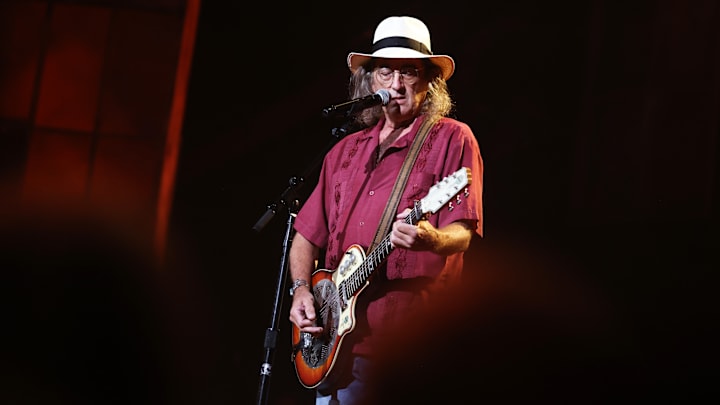I’ll admit up front that I probably cannot write an unbiased review of a James McMurtry album. I think he is the best storyteller plying his craft in the USA today, and probably has been for the past couple of decades. Unlike his father, Larry, among the greatest long-form fiction writers in the latter half of the 20th century, James uses songs as his medium of choice.
2021’s The Horses and the Hounds was as good an album as he has ever done, and that's quite a statement. It didn’t have the virtuosic highs of some of his earlier disks, but as a consistent collection of songs – funny and tragic, poignant and incisive – it has few equals.
It has been four years since The Horses and the Hounds, but McMurtry is at it again with his eleventh studio release, The Black Dog and the Wandering Boy. And again, he proves why his stories lay bare the restless soul of America better than anyone else’s.
James McMurtry delivers another devastating portrait of current times
The Texas-based singer/songwriter opens and closes his latest album with covers, and that is somewhat out of character. I don’t believe he has put a cover on an album since 2005’s Childish Things. He may have co-written several songs on recent releases, but they all have his particular stamp.
No worries. The covers in question fit right in. Jon Dee Graham’s “Laredo (Small Dark Something)” kicks things off on a wave of guitar fuzz, adding tales of the hopelessness of addiction. It sets the tone. McMurtry is acutely aware of the dark times we are in.
He bookends it with a cover from Kris Kristofferson, a songwriter who helped pave the way for the likes of McMurtry more than fifty years ago. McMurtry has been singing “Broken Freedom Song” in his concerts over the last year, and it serves as an ideal weary closer, which still manages to offer a ray of hope. Broken hope, perhaps.
In between those songs, it’s all McMurtry, and he again delivers with powerful portraits like “South Texas Lawmen” about an aging old-school type who “hunts quail from horseback and cheats on both his wives,” and who is simply fed up with the way the world has changed.
He keeps probing how the aging generation is simply being worn down to nothing by the pace of change on “The Color of Night.” Musically, that track reveals one of the real secrets of McMurtry’s skill with melody.
The beginning of the verse recalls “Blackberry Winter,” the closing track from The Horses and the Hounds, while the rhythm of the end of the verse is repurposed from 2008’s “Hurricane Party.”
Like so many great writers before him, McMurtry can recycle old ideas and turn them into something new and fresh.
Another recent live staple, “Pinocchio in Vegas,” is one more carefully observed portrait that no other songwriter would have dreamed up. But the theme of trying to understand how we have reached this crossroads in history remains constant. And the cleverness and economy of the lyric remains rarefied…
“When the claims came to light, Pinocchio was blue
The lawyers had a field day, just like they always do
First they tried to fleece him for a rainbow’s worth of gold
He had to sue Walt Disney over copyright control
He got less than he wanted
More than they’d to give
Both sides are bitter
Both sides’ll live.”
McMurtry continues one strong song after another – from the tragic “Annie,” a personal recounting of 9/11 with a brutal takedown of the president at the time – to the funkier “Back to Coeur d’Alene.”
Toward the end comes the song for which this album will be known, in the way that “We Can’t Make it Here” came to define Childish Things, and “Choctaw Bingo” hangs over Saint Mary of the Woods.
McMurtry has been performing “Sons of the Second Sons” at live shows for several years now. He introduces it by saying the song breaks down how the European tradition of primogeniture set the stage for what we are all experiencing in 2025 America – and then he proceeds to do just that.
McMurtry has never been shy when it comes to stating political beliefs – when Texas instituted a prohibition on drag shows a few years back, he came out in a dress to confront the question. But he has rarely been as overtly bitter as we find him today.
“Sons of the second sons
Products of genocide
Polishing up our guns
Righteous and justified
Sons of the peasantry
Feeling they’re finally free
Sons of the faithful serfs
Salt of the blessed earth
In search of a master."
I’ve heard McMurtry sing that song by himself three or four times by now, but on the album, he gets the support of a full band, and it creates an even more powerful statement. Throughout The Black Dog and the Wandering Boy, he has a frequent touring partner, Betty Soo, singing harmony, along with Tim Holt on guitar, and Cornbread (bass) and Daren Hess (drums) providing the rhythm.
He also has guests like Sarah Jarosz (banjo), Bukka Allen (accordion), and Charlie Sexton (guitar) dropping by to create a fuller sound.
Ultimately, I don’t think the new album has quite the range of emotion found on McMurtry’s last effort. He seems a little more disgusted by the world today. But there is not a weak song to be found. Ever since he shifted from chasing pop success in his earliest days as a recording artist and began chronicling American people and American life, he has not released a weak song.
The Black Dog and the Wandering Boy continues that tradition. Ten tracks – each one of them heartfelt and meaningful.
